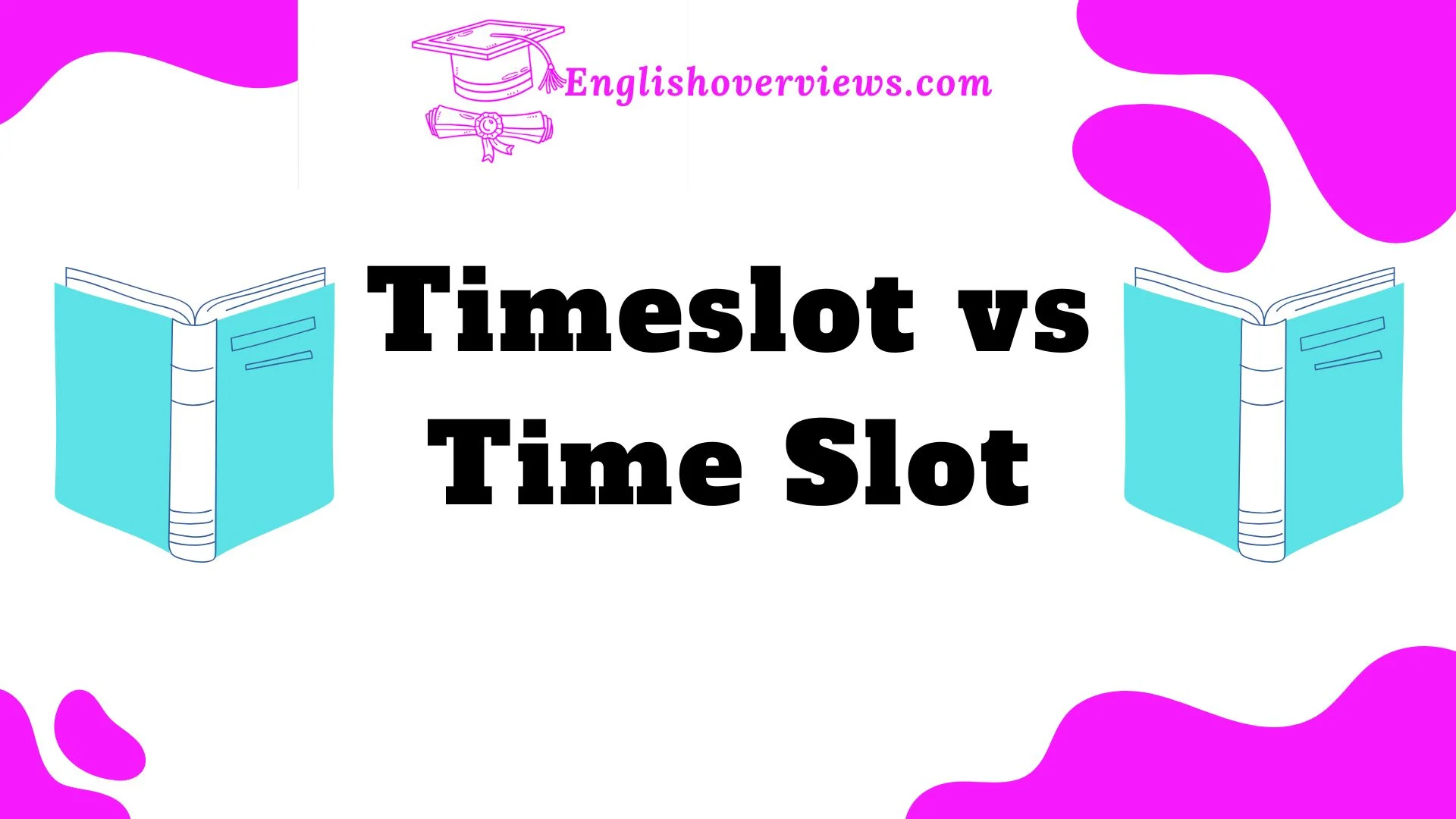If you’ve ever wondered about the proper use of timeslot vs. time slot, you’re not alone. This small grammatical detail may seem trivial at first, but it plays a crucial role in both written communication and clarity of expression. The debate between these two forms has puzzled many, with some using them interchangeably, while others strictly adhere to one or the other.
So, which one should you use, and why does it matter? Let’s dive into the debate and explore the key differences between timeslot and time slot, providing clarity on when and how to use each term.
The rules around hyphenation in compound words have always been a bit fuzzy, and with the evolution of language, things can get even murkier. But don’t worry-we’re here to break it all down for you in simple terms.
By the end of this article, you’ll be confident in your understanding of timeslot vs. time slot, and you’ll know when each is appropriate to use.
What Is a Timeslot?
Let’s start by defining the term timeslot. In its most common usage, timeslot refers to a specific time period assigned to an event, show, or activity. This term is widely used in industries like television, radio, and event management, where precise scheduling is crucial.
Examples:
- “The meeting is scheduled for the 3:00 PM timeslot.”
- “The TV show airs in the 8:00 PM timeslot every week.”
Notice that timeslot is used as a compound noun, where two words are joined together to form a single entity. It’s also worth mentioning that timeslot tends to appear more frequently in informal contexts, particularly in digital communication, like texting or social media. This is likely because it’s shorter and easier to type, making it a popular choice in fast-paced conversations.
While it’s not “wrong” to use timeslot, it can be viewed as more of an informal construction, especially when used in professional or academic writing.
What Is a Time Slot?
Now, let’s talk about the more traditional, two-word form: time slot. This is the standard and more formally accepted version of the term. It refers to a specific period reserved for an event or activity, just like timeslot, but it’s written as two separate words.
Examples:
- “We’ve reserved a time slot for your appointment.”
- “Please let me know your preferred time slot for the call.”
The two-word version is widely used in formal writing-in emails, reports, academic papers, and business correspondence. The separation of the two words makes the meaning clearer and helps maintain grammatical precision. Time slot is also the preferred form in most style guides and grammar rules.
For formal settings, using time slot ensures that your writing adheres to proper grammar conventions. While some people may use timeslot out of convenience, time slot still reigns as the more appropriate choice in formal contexts.
The Hyphenation Rule: What Does It Tell Us?
One of the core reasons behind the debate between timeslot and time slot lies in the hyphenation rule. In English, compound nouns often get written as either two separate words, one word, or hyphenated. Hyphenation rules, especially when it comes to compound nouns, can be tricky and often depend on the context and the type of compound noun.
- No hyphen: Time slot – The two words are distinct.
- Hyphenated: Time-slot – Sometimes used when the compound modifies another noun.
- Single word: Timeslot – A more informal, one-word version.
The Hyphenation Debate
When you combine two words to form a compound modifier, the hyphen is often used to make the meaning clearer. For instance, time-slot booking or time-slot availability. But when the words are used as stand-alone nouns (e.g., “We have a time slot”), the hyphen is typically dropped.
Example:
- Time-slot: “We offer a time-slot booking system.”
- Time slot: “The time slot for your meeting has been confirmed.”
Timeslot vs. Time Slot in Formal Writing
In formal writing, using the correct terminology becomes even more important. Professionals, academics, and writers should avoid any ambiguity in their communication. So, when it comes to timeslot vs. time slot, time slot is the preferred choice.
For instance, in a business email discussing a meeting or appointment, you’d want to use the term time slot to maintain a professional tone. Using timeslot might seem overly casual or even incorrect in certain professional environments.
Example:
- Correct: “Please let me know your preferred time slot for the meeting.”
- Incorrect: “Please let me know your preferred timeslot for the meeting.”
This distinction is particularly important in academic writing as well. In formal contexts, the goal is to maintain clarity, and using the two-word form, time slot, ensures that you’re following proper grammar conventions.
Common Mistakes to Avoid
Even though the difference between timeslot and time slot might seem simple, many people still make common mistakes. Here are a few to watch out for:
- Using timeslot in formal writing: The biggest mistake is using the informal timeslot in professional or academic contexts where time slot is expected.
- Confusing compound modifiers: Be careful when using time-slot as a compound modifier (e.g., “time-slot booking”). Not every use of timeslot requires a hyphen.
- Overusing timeslot in informal contexts: While timeslot is more casual, don’t overdo it in casual conversation. Sometimes time slot can still work better, depending on context.
Tip: If in doubt, always opt for time slot in formal writing.
Timeslot in Informal Contexts
In contrast to the formal preference for time slot, timeslot has become more common in informal contexts. Whether it’s in social media posts, texts, or informal emails, people often favor the shorter, hyphenated version of the term.
This trend can be attributed to the fast-paced nature of digital communication, where brevity is key. Writing timeslot instead of time slot saves time and characters, making it a go-to choice for quick exchanges.
Examples:
- “I’ll be free during the 2 PM timeslot.”
- “Can we reschedule your timeslot to 5 PM?”
This shift towards informal usage doesn’t necessarily make timeslot incorrect; it simply reflects the evolution of language and how informality plays a role in communication.
The Evolution of Language and Informal Usage
Languages are always evolving, and the use of compound words like timeslot is no exception. Historically, compound words were more rigidly separated, but with time and the influence of digital communication, shorter versions have gained more popularity.
For example, timeslot may not have been as widely accepted a few decades ago, but with the rise of technology, it’s become almost second nature for many people, especially in the world of television programming, streaming services, and event management.
Language is dynamic-what was once considered incorrect might now be acceptable, especially in the world of informal communication.
Hyphenation in Compound Modifiers: The Case of Time-Slot
When using time slot or timeslot as a compound modifier (i.e., when the words modify another noun), the hyphen often comes into play.
For example:
- Time-slot reservation: Referring to reserving a specific slot of time.
- Time-slot availability: Refers to the availability of a specific time slot.
The hyphen is used to create a single modifier, making the meaning clearer. Without the hyphen, the two words might be misinterpreted as two separate ideas.
Maximizing Clarity: Why Choosing the Right Form Matters
Whether you use timeslot or time slot, choosing the correct form is essential for maximizing clarity in communication. Using the wrong form can lead to confusion, especially if your audience is unfamiliar with the specific rules of hyphenation.
Here are some tips for getting it right:
- Use time slot in formal contexts like business communications, academic papers, and professional documents.
- Stick to timeslot in informal or digital contexts where speed and brevity are key.
- Pay attention to whether the term is functioning as a compound modifier or a standalone noun, as this will determine whether a hyphen is needed.
Conclusion: Simplifying the Debate
The timeslot vs. time slot debate boils down to understanding context and being mindful of how language evolves. While both forms are acceptable in certain situations, the key is choosing the right one for the right occasion.
- Use time slot in formal, professional writing.
- Opt for timeslot in informal contexts, especially in digital communication.
- Remember, hyphenation matters-when in doubt, go with the two-word version unless you’re dealing with a compound modifier.
By following these simple guidelines, you’ll be able to navigate the timeslot vs. time slot debate with ease, ensuring that your writing is both clear and appropriate for your audience.
FAQs
1. What is the difference between “timeslot” and “time slot”?
The main difference lies in how the terms are written:
- Time slot (two words) is the traditional, formal version used in academic, professional, and official writing.
- Timeslot (one word) is the more informal, often colloquial version used in casual conversation or digital communication.
2. Is it wrong to use “timeslot” in formal writing?
While it’s not technically “wrong,” timeslot is generally considered more informal and may not be appropriate in formal contexts. It’s better to use time slot in academic papers, business emails, and professional documents to maintain clarity and follow standard grammar rules.
3. When should I use a hyphen with “time slot”?
The hyphen is used when “time slot” functions as a compound modifier before a noun. For example:
- Time-slot reservation (a reservation for a specific time). However, when the phrase is not modifying a noun, you should not use the hyphen (e.g., “We have a time slot available”).
4. Can “timeslot” be used in professional communication?
Although timeslot is more casual, it can be used in professional communication when the tone is less formal, such as in quick emails or digital conversations. However, it’s best to stick with time slot in more formal business or academic settings.
5. Why does “timeslot” sound more natural in digital communication?
In digital communication, brevity and speed are often prioritized. Timeslot is shorter and quicker to type, making it more suitable for platforms like social media, instant messaging, or casual emails, where fast communication is key.

Alyan Ashraf is the creative mind behind English Overviews, a platform dedicated to helping learners master the English language. Passionate about education and language development, Alyan specializes in simplifying complex English concepts, making learning accessible for students of all levels.











